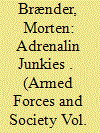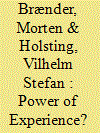|
|
|
Sort Order |
|
|
|
Items / Page
|
|
|
|
|
|
|
| Srl | Item |
| 1 |
ID:
143278


|
|
|
|
|
| Summary/Abstract |
This article calls for military sociologists to contribute to the study of excitement motivation. Bravery has always played a dominant role in depictions of soldiers in popular culture, and the importance of concepts similar to excitement has been recognized in disciplines adjacent to sociology for decades. Given the transgressive nature of combat, we would intuitively expect soldiers to have their need for thrilling experiences satisfied during deployment, and hence their level of excitement motivation to have decreased when they return from war. However, the opposite seems to be the case. Soldiers return wanting more, and we lack a theoretical explanation why this is the case. This article starts closing this gap by offering one possible reason. And, most importantly, it calls for other researchers to offer other explanations as well. The explanation suggested here is that just like real drug addicts build up a physiological tolerance to narcotics, soldiers can become “adrenalin junkies” because their tolerance toward excitement is “pushed upward” by being exposed to danger. This explanation is tested, and finds partial support, using panel data with soldiers from two Danish companies, serving in Helmand, Afghanistan in 2011.
|
|
|
|
|
|
|
|
|
|
|
|
|
|
|
|
| 2 |
ID:
183835


|
|
|
|
|
| Summary/Abstract |
Traditionally, the military is seen as an unequivocally authoritarian organization. With survey data collected at the Royal Danish Military Academy, this study shows that that is a qualified truth. Thus, cadets enrolled directly from the noncommissioned officer corps—those most acquainted with the norms of the armed forces—do not weigh authoritarian leadership values over nonauthoritarian ones. Instead, their view reflects that for the experienced leader, the context, and not overt ideals, enables them to choose the leadership tools they expect will prove most effective. On the contrary, cadets enrolled based on their civilian merits clearly prioritize authoritarian values. This is particularly true among cadets returning to the military after a break, former professionals, and former draftees alike. Their view also reflects experience, but a different kind of experience, as they have primarily encountered the military hierarchy from the receiving end.
|
|
|
|
|
|
|
|
|
|
|
|
|
|
|
|
|
|
|
|
|